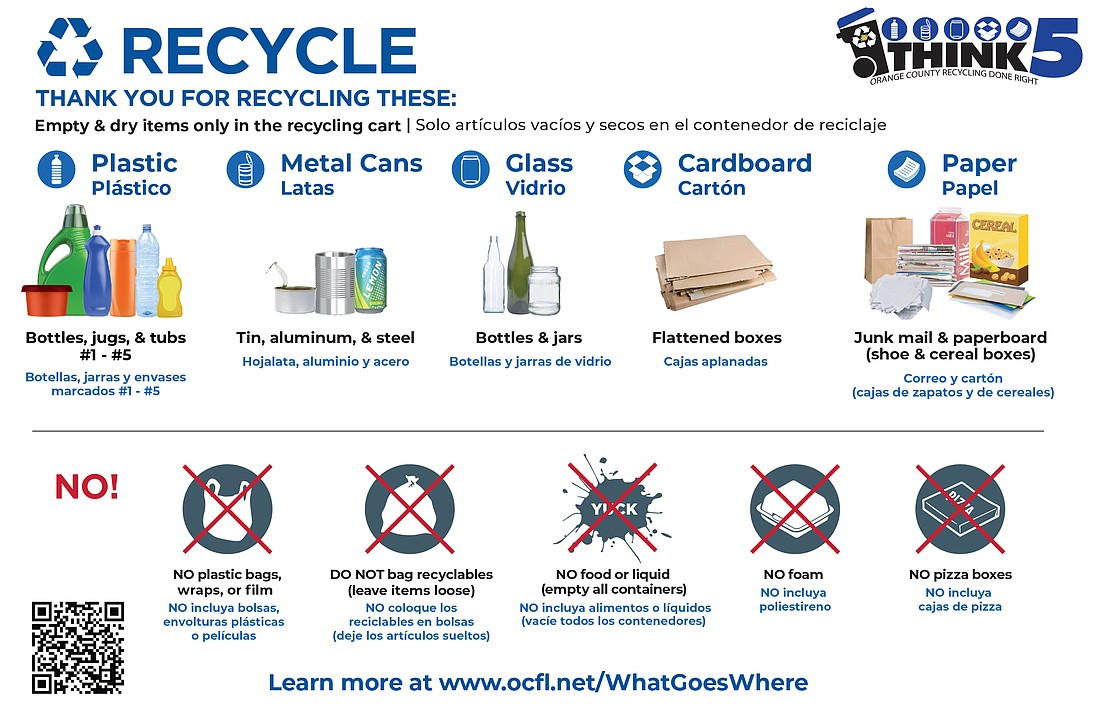- December 22, 2024
-
-
Loading

Loading

Nearly 190,000 households in unincorporated Orange County have been graded on their recycling knowledge since the county’s solid waste department initiated a recycling education program in late 2019.
“We started this … to help educate residents about recycling because we were finding that people were putting in the wrong things, and when they do, it contaminates the whole load,” said Debbie Sponsler, section manager for Orange County Utilities Communications Group.
How does the county know if residents place the wrong item in the recycling bin? Orange County has a contracted crew that looks through the recycling bins in selected neighborhoods before the recycling trucks arrive to empty them. Residents receive a card that reads, “Good job,” “Good try” or “Oops” with specific guidance on how to improve.
Households that improperly recycle will get an “Oops” card with the prohibited item marked.
Most recently, the crews have been evaluating bins in Horizon West communities, including Lakes of Windermere.
The program costs about $30,000 monthly, which covers the field work, labor and transportation costs of the four cart monitors to inspect about 5,000 homes per month.
The contracted personnel collect data over a four- to six-week period, and Sponsler said the idea is to see if residents improve during that time. The county has returned to a few neighborhoods to check citizens’ recycling retention.
“Our No. 1 contamination is plastic bags,” Sponsler said. “People are either putting in plastic wrappers or they put their recycling in plastic bags. … If they’re putting the wrong things in, that whole truckload can get rejected and end up in the landfill.”
Sponsler urges residents to stick with the idea of “Think 5.”
THINK 5
The Orange County Code requires recycling. To reduce the amount of garbage in the recycling stream, the Orange County Utilities Solid Waste Division encourages residents to “Think 5” by focusing on the top five recyclable items — plastic, metal and glass containers; as well as cardboard and paper.
Only these items can be placed in the recycling cart:
• Plastic — Bottles, jugs and tubs labeled No. 1 through No. 5
• Metal cans — Tin, aluminum and steel
• Glass — Bottles and jars
• Cardboard — Flattened corrugated boxes
• Paper — Newspapers and advertisements; paper bags; junk mail; magazines and catalogs office and note paper; phone books; cereal, shoe and drink boxes; and milk and juice cartons.
What is prohibited? Basically, anything not on the Think 5 list, Sponsler said. She said it can get confusing.
“When in doubt, leave it out,” Sponsler said. “That’s what we tell people all the time. … What we find is most people want to ‘wish recycle.’ They wish (an item) is recycling and they recycle it.”
For instance, frozen cardboard pizza boxes can be recycled, but takeout pizza boxes, which are contaminated with grease, cannot go in the recycling bin. Aluminum cans can be recycled, but aluminum foil and metal baking pans cannot. Plastic containers can go in the recycling cart, but the plastic packages that hold fresh fruit, such as blueberries, blackberries and strawberries, are not allowed.
Foam containers are a no-no. Bottle caps are allowed only if they are screwed onto the bottle.
Sponsler said bubble wrap, shipping envelopes and the plastic wrap around paper towels and toilet paper can be recycled — but not in the curbside carts. A list of drop-off locations can be found at plasticfilmrecycling.org.
The Think 5 program is only for residents of unincorporated Orange County, Sponsler said. Local municipalities might have similar programs, but each one sets its own recycling rules. The centralfloridarecycles.org website has a list of several cities, including Winter Garden, and what is allowed in the recycling bin.